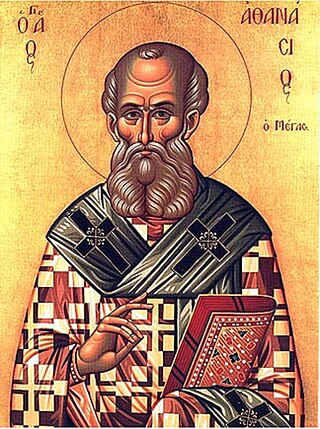
Athanasius I of Alexandria, also called Athanasius the Great, Athanasius the Confessor, or, among Coptic Christians, Athanasius the Apostolic, was a Coptic church father and the 20th pope of Alexandria. His intermittent episcopacy spanned 45 years, of which over 17 encompassed five exiles, when he was replaced on the order of four different Roman emperors. Athanasius was a Christian theologian, a Church Father, the chief defender of Trinitarianism against Arianism, and a noted Egyptian Christian leader of the fourth century.
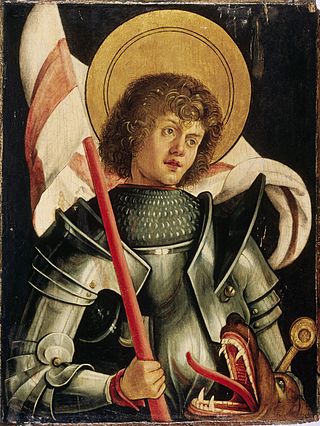
Saint George, also George of Lydda, was a Christian who is venerated as a saint in Christianity. According to tradition he was a soldier in the Roman army. Saint George was a soldier of Cappadocian Greek origin and member of the Praetorian Guard for Roman emperor Diocletian, who was sentenced to death for refusing to recant his Christian faith. He became one of the most venerated saints and megalomartyrs in Christianity, and he has been especially venerated as a military saint since the Crusades. He is respected by Christians, Druze, as well as some Muslims as a martyr of monotheistic faith.
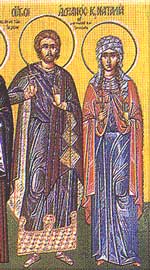
Adrian of Nicomedia or Saint Adrian was a Herculian Guard of the Roman Emperor Galerius Maximian. After becoming a convert to Christianity with his wife Natalia (Ναταλία), Adrian was martyred at Nicomedia in Asia-Minor (Turkey). Hadrian was the chief military saint of Northern Europe for many ages, second only to Saint George, and is much revered in Flanders, Germany and the north of France.

Pope Fabian was the bishop of Rome from 10 January 236 until his death on 20 January 250, succeeding Anterus. A dove is said to have descended on his head to mark him as the Holy Spirit's unexpected choice to become the next pope. He was succeeded by Cornelius.

Flavia Julia Helena Augusta was an Augusta and Empress of the Roman Empire and mother of Emperor Constantine the Great. She was born in the lower classes traditionally in the Greek city of Drepanon, Bithynia, in Asia Minor, which was renamed Helenopolis in her honor, though several locations have been proposed for her birthplace and origin.

Margaret, known as Margaret of Antioch in the West, and as Saint Marina the Great Martyr in the East, is celebrated as a saint on 20 July in the Western Rite Orthodoxy, Roman Catholic Church and Anglicanism, on 17 July by the Eastern Orthodox Church and on Epip 23 and Hathor 23 in the Coptic Orthodox Church of Alexandria.

Lucian of Antioch, known as Lucian the Martyr, was a Christian presbyter, theologian and martyr. He was noted for both his scholarship and ascetic piety.

During the reign of the Roman Emperor Constantine the Great (AD 306–337), Christianity began to transition to the dominant religion of the Roman Empire. Historians remain uncertain about Constantine's reasons for favoring Christianity, and theologians and historians have often argued about which form of early Christianity he subscribed to. There is no consensus among scholars as to whether he adopted his mother Helena's Christianity in his youth, or, as claimed by Eusebius of Caesarea, encouraged her to convert to the faith he had adopted.

Saint Pantaleon, counted in Western Christianity as among the late-medieval Fourteen Holy Helpers and in Eastern Christianity as one of the Holy Unmercenary Healers, was a martyr of Nicomedia in Bithynia during the Diocletianic Persecution of 305 AD.
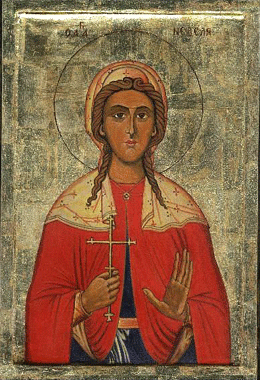
Saint Kyriaki, also known as Saint Kyriaki the Great Martyr, is a Christian saint, who was martyred under the emperor Diocletian.

Alexander of Jerusalem was a third century bishop who is venerated as a martyr and saint by the Eastern Orthodox Church, Oriental Orthodox churches, and the Roman Catholic Church. He died during the persecution of Emperor Decius.
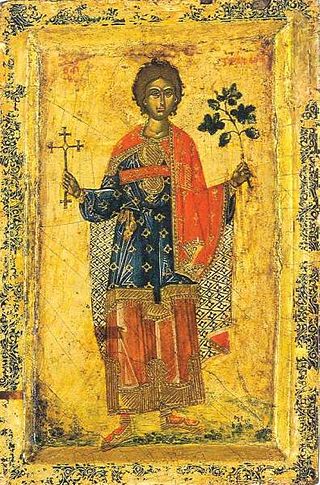
Saint Tryphon of Campsada was a 3rd-century Christian saint. He is venerated by the Roman Catholic and Eastern Orthodox churches as a great martyr and holy unmercenary.

Saints Cyprian and Justina are honored in the Catholic Church, Eastern Orthodox Church and Oriental Orthodoxy as Christians of Antioch, who in 304, during the Diocletianic Persecution, suffered martyrdom at Nicomedia on September 26. According to Roman Catholic sources, no Bishop of Antioch bore the name of Cyprian.
Acepsimas of Hnaita was a bishop, martyr and saint.

The 20,000 Martyrs of Nicomedia refers to victims of persecution of Christians in Nicomedia, Bithynia by the Roman Emperors Diocletian and Maximian in the early 4th century AD.
Michael of Synnada or Michael the Confessor was a metropolitan bishop of Synnada from 784/7 to 815. He represented Byzantium in diplomatic missions to Harun al-Rashid and Charlemagne. He was exiled by Emperor Leo V the Armenian because of his opposition to iconoclasm, and died on 23 May 826. He is honoured as a saint by the Eastern Orthodox and Roman Catholic churches, his feast day is May 23.
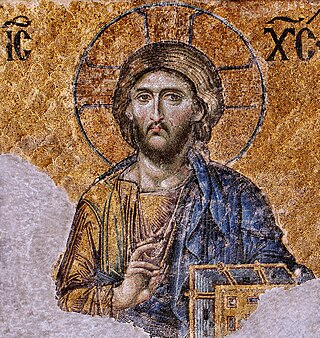
This is a timeline of the presence of Eastern Orthodoxy in Greece from 33 to 717 AD. The history of Greece traditionally encompasses the study of the Greek people, the areas they ruled historically, as well as the territory now composing the modern state of Greece.

August 21 - Eastern Orthodox liturgical calendar - August 23

Andrew the Apostle, also called Saint Andrew, was an apostle of Jesus according to the New Testament. He is the brother of Simon Peter and is a son of Jonah. He is referred to in the Orthodox tradition as the First-Called.

Stephen is traditionally venerated as the protomartyr or first martyr of Christianity. According to the Acts of the Apostles, he was a deacon in the early Church at Jerusalem who angered members of various synagogues by his teachings. Accused of blasphemy at his trial, he made a speech denouncing the Jewish authorities who were sitting in judgment on him and was then stoned to death. Saul of Tarsus, later known as Paul, a Pharisee and Roman citizen who would later become a Christian apostle, participated in Stephen's martyrdom.
















